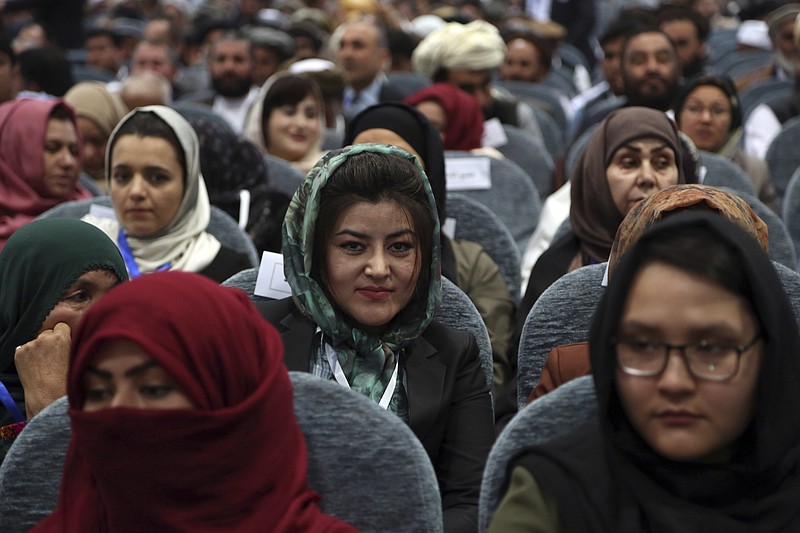On Tuesday, Secretary of State Mike Pompeo said "the hour has come for peace" in Afghanistan.
Of those who saw his statement, many low-information news consumers may have said, "We're at war with Afghanistan. Who knew?"
Others who once knew we were in a shooting war in the South-Central Asian country against the terrorist Taliban regime probably forgot they knew. After all, it's been 17 1-2 years, and news from the war rarely gets in the newspapers or makes broadcast reports. But it's no laughing matter to the families of the more than 2,400 United States troops who have been killed in the country.
For those who may have forgotten, former President George W. Bush, following the Sept. 11, 2001, terrorist attacks, demanded that the Taliban, who were the de facto rulers of the country, hand over Osama bin Laden, who was thought to be the mastermind behind the 9/11 attacks and was believed to be living or hiding in Afghanistan.
The Taliban refused to extradite him unless it was given clear evidence of his involvement in the attacks, which the United States declined to provide. Thus, on Oct. 7, 2001, the U.S. and the United Kingdom launched Operation Enduring Freedom. And there we have been ever since.
Pompeo, though, said the U.S. is close to a deal with the Taliban on ending its support for terrorism in exchange for the U.S. withdrawing its troops at some date in the future.
"While we've made clear to the Taliban that we are prepared to remove our forces," he told reporters at the U.S. embassy in Kabul, "I want to be clear we have not yet agreed on a timeline to do so."
That, in itself, is an improvement from Obama-era policies, where dates for withdrawals were announced well ahead of time, allowing the enemy to know when precisely to re-entrench.
Pompeo, suggesting a four-step process, said "real progress" had been made and said the U.S. is "nearly ready to conclude draft text that would outline the Taliban's commitment to ensure Afghanistan never again becomes a safe haven for terrorists.
The secretary of state, God bless him, we wish him all the success in the world in concluding such an agreement. Pardon us, though, if we're a little skeptical.
We remember, unfortunately, another secretary of state's utterance at the proposed end of another long war: "We believe that peace is at hand."
That was Henry Kissinger on Oct. 26, 1972, saying secret negotiations had led to the brink of the end of U.S. involvement in Vietnam, which had gone on for more than a decade.
"[W]hat remains to be done," he said, "can be settled in one more negotiating session with the North Vietnamese negotiators, lasting, I would think, no more than three or four days."
But talks broke down that December, 100,000 bombs failed to convince the North Vietnamese to make any more concessions, and talks resumed again in January. Finally, on Jan. 23, 1973, a final agreement was announced. It called for a cease-fire, the release of American prisoners of war, an arrangement for U.S. troops withdrawals and a "council of national reconciliation."
The "council of national reconciliation," expected to resolve political issues through the supervision of elections, never happened, and, although the U.S. had largely departed, the war raged on for more than two years. Finally in April 1975, the exhausted, demoralized South Vietnamese Army quit fighting, and the entire country fell under communist rule.
Now, Pompeo said the agreement he anticipates and subsequent withdrawal of U.S. troops would "open the door" to direct talks between the U.S.-backed Afghan government and the Taliban.
"We are not and will not negotiate with the Taliban on behalf of the government or people of Afghanistan," he said. "Rather, we're working to bring Afghans together at the negotiating table to decide the future of their own country collectively."
We would like to believe the two sides in turn would work together to create a stable country and government, but we remember Kissinger and then-President Richard Nixon offering assurances 46 years ago on how North Vietnam and South Vietnam would collaborate in order to bring about a peaceful coexistence in that Southeast Asia country.
Totalitarian regimes like communist North Vietnam and the Taliban, in the end, rarely want to play nicely.
At this point, though, it seems counterproductive to continue fighting a war that is never going to be effectively won. The Soviet Union learned this after invading Afghanistan in 1979 and, never having secured a foothold, withdrawing in 1989. Bin Laden, the instigator of the 2001 U.S. crusade into Afghanistan, was killed by U.S. Navy SEALs across the border in Abbottabad, Pakistan, in 2011.
It would be nice to say the U.S. got more out of its 17 plus-year excursion than a dead bin Laden and a partially freed country, but we're not sure we did. Now we must hope that Pompeo's peace entreaties work better than did Kissinger's.
